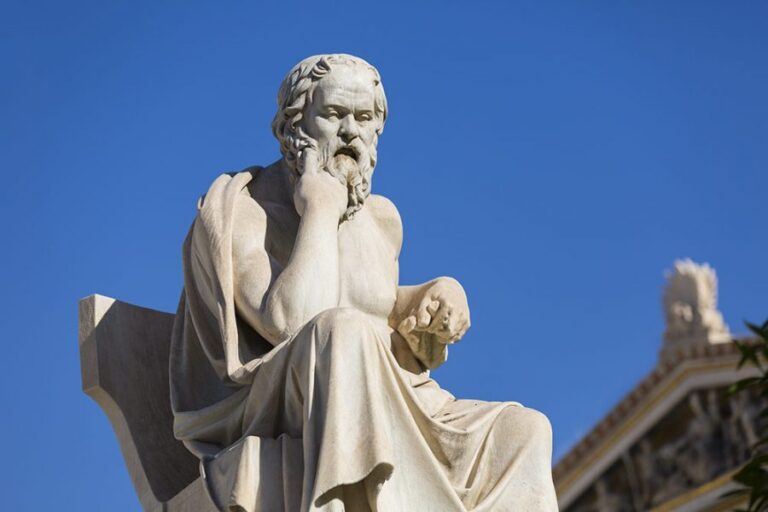A philosopher, Socrates was a person who devoted his life to the questions about “how people should live” and continued to pursue the truth. By asking questions rather than teaching people, the method that led to the next step by deep-understanding and awareness of the person’s own thoughts and wisdom is called “Socratic questioning method”. It is used in our current business and educational onsite. This time, I would like to explain the Socratic questioning method briefly in an easy-to-understand manner.
About Socrates
Socrates (469 BC – 399 BC) was the founder of philosophy who lived in ancient Athens, Greece. He used the Socratic questioning method to people, who thought they were wise and who had authority, in order to make them be aware of their ignorance. Why did he start to act like that?
One day, when Socrates’ disciple, Caleiphon, asked at the oracle of Apollo, “Is there anyone wiser than Socrates?” The answer was there was no anyone who was wiser than Socrates. When Socrates heard this, he couldn’t believe it. It would be the same as God acknowledging that Socrates was an excellent sage.
Socrates knew his ignorance. After that, he tried to prove his ignorance by visiting people called wise men and asking them questions. However, most people were unable to answer his question. One day, Socrates began to think, ‘’I am better off knowing that I am ignorant.’’ This leads to the idea of Socrates questioning method/technique.
From there, Socrates’ lifework of making people aware of their ignorance began. (Socrates questioning method/technique was born.) This action began with his good intentions to lead people in a right direction, however when he was 69 years old, he was put on trial and sentenced to death. It is said that the cause of this was the antipathy of those in power at the time, the defeat of Greece and Athens, and the decline of national power due to Socrates’ ideas.
Socratic Questioning Method
The questions-and-answers method used by Socrates was to make the opponent aware of contradictions by asking questions repeatedly. To make it easier to understand, let’s take a look at the following dialogue examples.

Power is the most important thing in the world. If you have power, you can do anything.

Hmm, anything…?

You can get a lot of people to follow you, and you’ll be treated like a VIP everywhere.

I see··. In other words, can you do anything if you make people obey you or are treated better than others?

Not only that. I get a lot of money, too. You can buy anything and go anywhere.

I see··. How about the things that power doesn’t give you? A healthy body, reliable family and friends can also be obtained with power?

There will be people who flock to power.

Can you say that they care about you and are important to you?

There may be some people who don’t.

With power, you can do anything, right?

Some things are not available.
This is an easy-to-understand dialogue example. The realizations that can be gained from the question-and-answer method are not taught by someone, but are derived from what they think. Socrates’ question-and-answer method encourages self-awareness by repeating questions rather than denying the other person’s opinion. If the other person does not understand the essence of things, repeated questions will inevitably lead to contradictions. By answering, the other party deepens their thoughts.
As Socrates said, “The only true wisdom is in knowing you know nothing.” Socrates is a philosopher who guided and developed the other person by encouraging them to realize that they did not fully understand what they thought, they had understood.
6 question types
There are six types of questions in the Socratic method.
Clarification questions
- What do you mean by…?
- Could you put that another way?
- What do you think is the main issue?
- Could you give us an example?
- Could you expand upon that point further?
Questions about an initial question or issue
- Why is this question important?
- Is this question easy or difficult to answer?
- Why do you think that?
- What assumptions can we make based on this question?
- Does this question lead to other important issues and questions?
Assumption questions
- Why would someone make this assumption?
- What is _______ assuming here?
- What could we assume instead?
- You seem to be assuming______.
- Do I understand you correctly?
Reason and evidence
- What would be an example?
- Why do you think this is true?
- What other information do we need?
- Could you explain your reason to us?
- By what reasoning did you come to that conclusion?
- Is there reason to doubt that evidence?
- What led you to that belief?
Origin or source
- Is this your idea or did you hear if from some place else?
- Have you always felt this way?
- Has your opinion been influenced by something or someone?
- Where did you get that idea?
- What caused you to feel that way?
Implication and consequence
- What effect would that have?
- Could that really happen or probably happen?
- What is an alternative?
- What are you implying by that?
- If that happened, what else would happen as a result? Why?
Viewpoint questions
- How would other groups of people respond this question? Why?
- How could you answer the objection that ______would make?
- What might someone who believed _____ think?
- What is an alternative?
- How are ____ and ____’s ideas alike? Different?
Resource: Intel® Teach Program. Designing Effective Projects: Questioning The Socratic Questioning Technique.
Various books have been published about the Socratic questioning method, so if you are interested, please take a look.
Socratic questioning method in business
Pointing out and giving feedback is not to attack and corner the other person, but to gain new realizations from the other person who has a perspective that you do not have. If the other party has an opposite opinion, you may feel uncomfortable about it. However, it is rather natural to have a different opinion than yourself. If you can’t make a convincing counterargument to the other person’s opinion, it means that you didn’t have enough deep-understanding and essence to persuade the other person.
The Socratic questions and answers method is effective in giving awareness to the other party, but it is counterproductive to corner the other party and make them angry. It is not a method to defeat the opponent by theoretical armament. People have self-esteem and pride, so the point is that the other person should notice themselves and act towards improvement. Socratic questions-and-answers method is established only with a humble attitude that there are still many things I haven’t known.
Socratic questioning method in education
The Socratic questions and answers method is sometimes used as an educational method that stimulates children’s curiosity and advances their logical understanding skills through a teaching method that encourages students to use their own thoughts and insights on complex subjects. An experiment was conducted in the United States to demonstrate that even children can understand difficult themes in an easy-to-understand manner by Socratic questioning method.
Richard Garlikov, who teaches ethics and philosophy at Troy University in Alabama, USA, conducted an experiment using the Socratic questioning method in a third grade elementary school class. This experiment was taken for school teachers to learn how to proceed with classes using the Socratic questions and answers method and how to concentrate children in class. The ostensible theme of the class was to teach students about binary arithmetic in the form of questions, but the main theme was to make teachers aware of the usefulness of the Socratic questioning method.
Children in the third grade of elementary school who do not even know the concept of decimal and binary numbers. They enjoyed attending Richard’s class and ended up with 19 out of 22 understanding all of the content. The class proceeded by alternately repeating questions from Mr. Garlikov and answers from the students, and 76 questions and answers were done in 25 minutes.
Reference: The Socratic Method: Teaching by Asking Instead of by Telling by Rick Garlikov
From a one-way teaching method to asking questions methods to students to deepen their curiosity and true understanding. Teachers also need a high level of skill and preparation, but it may be interesting if the Socratic questioning method is used more to cultivate deep thinking.
Summary
- Socrates thought that repeating questions to the other person made them aware of contradictions in their thoughts.
- Socratic questioning method is to encourage action for improvement and development.
- The Socratic questioning method is also effective as an educational method for improving children’s curiosity and understanding.
I gave a brief introduction of the Socratic questioning method. In order to actually use it, not only preparation but also experience including failure is important. Please take advantage of it in education, business and real life.



Comment